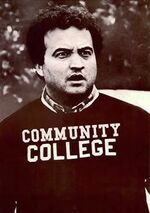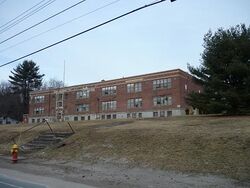Community college
A community college is a generic, laid-back, more affordable college experience for those who were not admitted to a real four-year university. Tuition is significantly cheaper and transfer classes have millions of prerequisites — to keep you there.
Student life[edit]
Typical students found at a community colleges include ex-convicts, divorced mothers, foreign exchange students, people with low self-esteem, hippies, burnouts, and degenerates. Most of the guys are taking online classes in their pajamas while watching Family Guy reruns. Half of the students attending a community college work, while the other half "study full-time." Students often attend a lecture of about 50 minutes, sit in desks that have been there since the Cold War period, and take notes that are written on the chalkboard rather than a markerboard without the screeching noise. Powerpoint, too, is sacrificed in favor of the venerable overhead projector.
When class is dismissed, students rarely talk with anyone they do not know, nor least of all ask the teacher a question. They are only enduring this cold, sterile environment in hopes of one day being able to transfer to a four-year university. However, there are many roadblocks along the way, such as: prerequisites, erratic and unusual class hours, and obnoxious counselors. There is also the fact that most communities are low-budget institutions that don't offer the classes you need in order to get into four-year universities. These students should have gotten better grades in high school and applied for four-years when they had the chance — In other words, community college is a place for your soul to die.
Faculty and administration[edit]
Community colleges, as with all educational learning facilities, have a faculty and administration. The faculty, although diverse in educational and cultural backgrounds, do share a common characteristic: an inability to obtain a better teaching position at a more fulfilling educational institution. In fact, a recent study has shown that approximately 90% of all faculty and administration employed at community colleges once previously attended those colleges as students, and an additional 60% of those students never graduated from those community colleges.
Administrators[edit]
The administrators at community colleges are usually composed of bitter old dinosaurs that have become somewhat senile in their closing years. Once a "child of the sixties," these administrators have been employed at these institutions long before your parents were even born. Spending an average 1-2 hours on campus every day, these hardworking college administrators ensure that they provide the best possible college learning experience for their students. Such bold acts of charity include:
- Ensuring the hallways are always filthy.
- Ensuring that classroom supplies are never upgraded.
- Prolonging the inspection of the Science building, which everyone knows is not up to code.
- Striking down anyone who dares attempt to repaint the putrid-colored campus.
- Ensuring that EVERYTHING on campus has price to it (parking passes, drinking fountains, bathrooms).
- Making sure their plaques are hung on every empty wall around campus.
- Collecting their checks at the end of the week.
Faculty[edit]
Faculty found at community colleges are a much more diverse group of people. However, they can almost always be classified into these common categories: Know-it-alls, Dinosaurs, Stoners, Dorks, Assholes, and Pretentious Assholes. Allow me to demonstrate: "Wow, Mr. Johnson sure is a pretentious asshole!". While the lectures these faculty members deliver to students is none the less satisfactory, it is simultaneously nothing special. Some teachers show up to work stoned out of their gorge! Others, like they've been up all night polishing the case to their Master's Degree at home in their half-million dollar mansion. After class, these individuals can typically be found back at their sparsely decorated office, usually with a bust of some ancient Greek intellectual on their desk, and awkwardly placed burgundy throw pillows on the couch across (there to encourage young schoolgirls to take FULL advantage of their "services"). They're also typically struggling to control their unkempt graying hair, and take great pride in wearing smelly worn-out corduroy blazers that ooze douchbaggery from every stitched fiber.
Often, faculty members will be seen wearing t-shirts depicting various artifacts of the indigenies, such as ceremonial tobacco pipes. However, said instructors are very sensitive about nicknames such as "Peace Pipes" that they might or might not have obtained at Williams Baptist College. However, more seedy faculty try to mask the fact that they enjoy taking drunken hikes through the woods at night with their students, making perilous jumps across creeks, which inevitably lead to having to strip each others clothes off to prevent hypothermia.
Counselors[edit]
The counselors at community colleges are some of the worst academic individuals on campus, and in some cases on the face of the earth! Highly skilled in crushing the dreams of young enthusiastic students, their primary objective is to break your spirit, make you feel stupid and worthless, and sign you up for millions of prerequisite classes that even you know you don't need!
It begins with a casual "hello" as you enter their office, and eventually descends into a one-way conversation as they lecture you about how difficult it is to get into a four-year university, and how you're better off just staying here taking prerequisite classes, all while subtly hinting at how your retorts are futile against their wall of academic jargon and education-technicals that you know nothing about!
Curriculum[edit]
Courses offered at clown, I mean community colleges are very similar to that found at four-year universities, with some differences. Community colleges require their incoming students to pass an impassable placement test, which usually results in the addition of prerequisite classes added to the class schedule. Prerequisites (pronounced cha-CHING) are courses that offer a review of rudimentary knowledge and skills that 99.99% of all enrolled students already possess. Why you ask? Why else? MORE MONEY! Well, money and for allowing their incompetent faculty to stay employed, and receive paychecks for their vague, unimpressive, sub-par teaching abilities. As a result, prerequisites are usually numerous and lettered, i.e. MATH-A, MATH-B, MATH-C (wow now they're just being patronizing assholes!) and share no common chronological or even coherent pattern (MATH-A precedes MATH-42, which is before MATH-G, which follows MATH-D, which is also equivalent in credits to MATH-36A). When put in technical terms: the curriculum at community college is a big steaming pile of caca-dookie!
Common Courses[edit]
Although each community college varies from region to region, each seems to share common courses with one another. Theses courses are highly useful and offer valuable skills that are relevant in today's world. They include:
- DOS Programming (non-transferable)
- FORTRAN Programming (non-transferable)
- Underwater basket weaving (non-transferable)
- Custodian Arts (non-transferable)
- Astrology (non-transferable)
- Addiction Studies (non-transferable)
- Film Appreciation Class (non-transferable)
- Porn Appreciation Class (non-transferable)
- Waste-water Technology (non-transferable)
- Liberal Studies
- Conservative Studies (AKA Abstinence Education)
- Photography (non-transferable)
- Academic Guidance (non-transferable)
Community colleges vs. universities[edit]
To understand the difference between a community college and a college, the reader need only note that many losers are consoled by being complimented on giving something "an old college try." But no one is praised for giving anything an old community-college try.
While one can advance from a community college to a four-year university, it is deliberately difficult to do so. A tiny number of students attending community colleges escape their torment and advance to four-year institutions, where they can switch from learning from out-of-work car mechanics to learning from permanently employed Marxists. And most of these students consequently become physically, psychologically, and socially drained of their original scholastic energy and ambition.
At community colleges, the teachers are usually inept and devoid of any scholarly mannerisms or diction. At universities, most of the co-eds are slutty and there are endless chances for coupling, especially with students who are only there to look for a husband. At community colleges, most of the co-eds are housewives and it is rare to find one who is sufficiently bored or close to divorce to put out.
At universities, students typically engage in epic recreational parties that last long into the night, although it is vanishingly hard to remember what happened to you at one. At community colleges, the student is lucky if the professor and student go to the bar for a single round on their way home to watch Grey's Anatomy.



